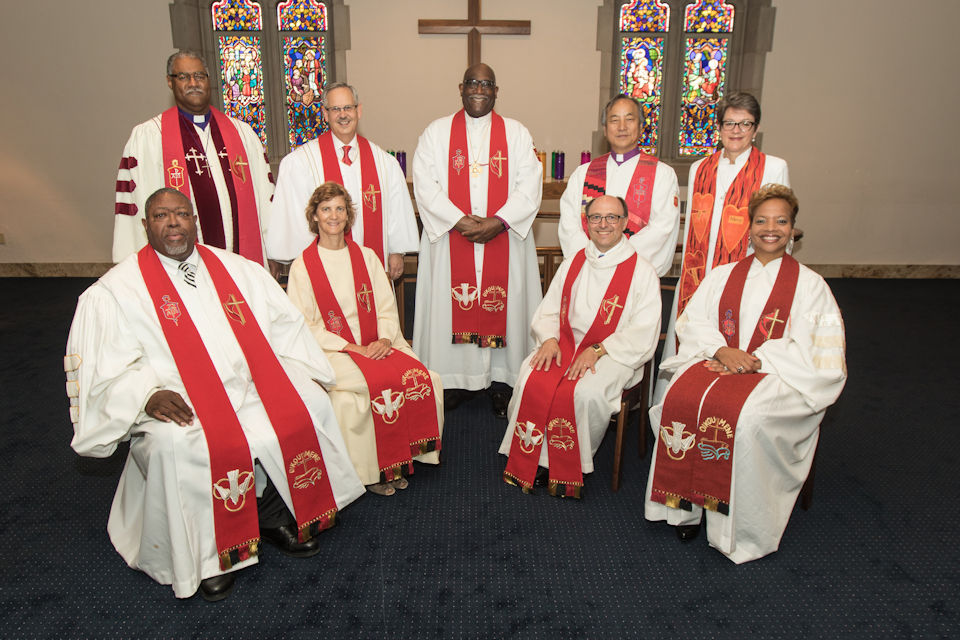The North Central Jurisdiction College of Bishops commits to deep prayer, listening, prophetic witness, and the promotion of antiracism.
For Christ is our peace … he has broken down the dividing wall, that is, the hostility between us. -Ephesians 2:14
The killing of George Floyd at the hands of police officers in Minneapolis, Minnesota, on May 25 has rocked our nation and world and pierced us to the core. The video image seared into our minds, hearts, and souls is horrific, terrifying, disgusting, and outrageous. While we’ve each made commitments and statements in our respective areas along with many of our cabinet members, we think it important to speak together as the North Central Jurisdiction College of Bishops. We affirm the work being done in each of our conferences, the work of the Council of Bishops, the work of our General Agencies, and the work of our ecumenical and interfaith partners in responding to this heartbreaking, soul-shattering event.
The North Central Jurisdiction, a place of vibrant big cities, small towns, fields, farms, forests, rivers, lakes, the Great Lakes, prairies, is often known for being nice – Midwest nice. The brutal killing of George Floyd laid bare that underneath the veneer of nice exists lingering and persistent racism, a racism that poisons our public life, stifles God-given human potential, and diminishes us all. Racism is as virulent a virus as the coronavirus, and it is also lethal. It is lethal in brutally public ways, as in the deaths of George Floyd or Ahmaud Arbery or Breonna Taylor. It is lethal in quieter ways, in the effects of poverty, lack of educational opportunities, sub-standard health care, lack of access to healthy foods, realities rooted in our country’s history: slavery, Jim Crow laws, redlining, separate but equal, native American displacement and trails of tears. Throughout our jurisdiction, racism has an impact on every community of color, including Native Americans. Yet, we acknowledge that anti-black racism has a unique perniciousness in our history and society.
Together we affirm the teachings of The United Methodist Church that racism is sin and antithetical to the gospel, “that racism is a rejection of the teachings of Jesus Christ… denies the redemption and reconciliation of Jesus Christ,” and “that racism robs all human beings of their wholeness.” Because racism is deeply rooted in our history, it is also deeply entangled in our minds, our hearts, and our systems. We confess and denounce our own complicity. We take a stand against any and all expressions of racism and white supremacy, beginning with the racial, cultural, and class disparities highlighted by the coronavirus pandemic. We challenge government leaders who fan the flames of racial division for political gain.
Together we commit ourselves to our baptismal vows to renounce the spiritual forces of wickedness, reject the evil powers of this world, to repent of our sin, and to use the freedom and power God gives us to resist evil, injustice and oppression in whatever forms they present themselves. Together we commit ourselves to the work of antiracism, work well defined by Ibram X. Kendi in his book How To Be an Antiracist. “The opposite of ‘racist’ isn’t ‘not racist.’ It is ‘antiracist.’ One endorses either the idea of a racial hierarchy as a racist or racial equality as an antiracist. One either believes problems are rooted in groups of people, as a racist or locates the roots of problems in power and policies as an antiracist. One either allows racial inequities to persevere, as a racist, or confronts racial inequalities as an antiracist. There is no in-between safe space of ‘not racist.’ The claim of ‘not racist’ neutrality is a mask for racism.” (9) We commit ourselves to this work in our lives and in our church. This is heart work and hard work, soul work, and social work requiring courage, humility, deep listening, and love. We commit ourselves to antiracism not as some addendum to the work of the gospel, not as a sideline social issue, but as a struggle for our souls, the soul of the church, and the soul of the nation.
Powerful opportunities for antiracism work have presented themselves before, and we have let them pass by. We will not let this opportunity pass. We commit ourselves to deep prayer for the eradication of racism in our lives, in our church, and our society. We commit ourselves to listen more deeply to each other and to the voices of those whose lives continue to be affected so profoundly by racism. We will use our voices and our positions to advocate for reform in policing practices in our communities so that those charged with protecting and serving protect and serve all and do so in ways that de-escalate violence. We will promote antiracism as an essential part of the journey with Jesus by encouraging increasing awareness. We will do this through the use of resources such as those provided by the General Commission on Religion and Race, books such as White Fragility (Robin Diangelo) or How To Be an Antiracist, and tools such as the Intercultural Developmental Inventory.
The dividing wall of racism, which has stood for too long, needs dismantling. Moving the stones of this wall requires heavy lifting, but the wall needs to be taken down. We commit ourselves to taking the stones from this dividing wall and letting the power of God’s Spirit transfigure these stones into stones of justice, peace, reconciliation, and love, stones with which to build a road toward God’s beloved community.
The Bishops of the North Central Jurisdiction
Last Updated on June 12, 2020

